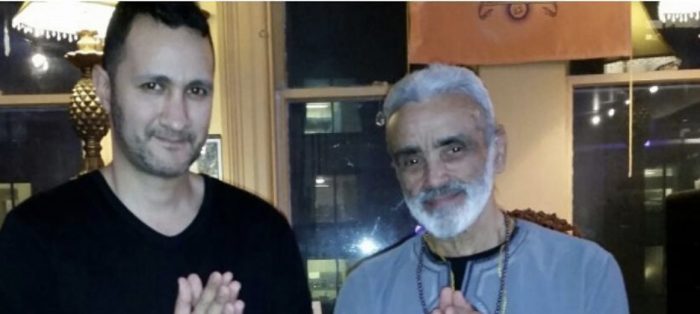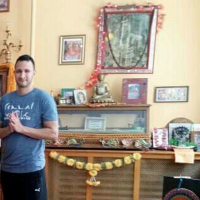It was 1972 when I was born and began life in Spanish Harlem, a first generation American from a family whose Catholic roots traced back to Colombia.
My family did not practice the genesis of Catholicism or living a life modeled after its Savior, but completion of rituals, sacraments and the external appearance of a Catholic life were chief among the values surrounding my early life. In Colombia, Catholicism is the national religion, and its teachings are as unquestioned as the notion that eating is a part of daily life.
I longed for a deeper connection and a more meaningful understanding of my world.
I was always a seeker of deeper understanding and rejected the formality of my early learning. My culture, my history, would have forbade such an exploration, but I understood from my first Yoga class that nothing about the practice of Yoga was counter to cultural traditions I knew, nor the true values of Catholicism. In fact, to some degree, the focus on inner silence and balance could enrich and deepen those principles.
Psalm 46:10 “Be Still and Know that I am God” was at the core of my early teachings, and Yoga provided a tool to enable me to literally be still.
As I began to share my interest in Yoga with friends, questions such as how a Catholic could participate in rituals that are counter to Judeo-Christian beliefs emerged in conversation. While I recognized that some of my friends viewed the practice of Yoga as suspect, I wanted to adequately explain that it doesn’t somehow hypnotize its practitioner into foregoing trusted values and traditions. Rather, it can reaffirm the certainty of being part of a bigger whole, connected to a larger power and empowered to be ever-present on a spiritual journey.
In Yoga, we recognize the sanctity of our bodies and its oneness with the mind. This notion directly supports clear directives in the New Testament. For example, 1 Corinthians 3:16 states: “Do you not know that you are God’s Temple and that God’s Spirit dwells in you?” Yoga is a practice that enables seekers to find their deepest nature, to transcend the limitations of labels and judgments that are natural to the human experience and recognize that our deepest nature extends beyond our self-concept, our bodies and our minds. This is consistent and supportive of the Christian notion of God dwelling within us. Yoga honors that temple that is our bodies; it teaches us to listen to it and treat it gently and with reverence. It teaches us that by physical wellness we can put our energy where it belongs: focused on spirituality and the inner workings of the mind and heart.
Today, I am more deeply committed to my place in the human family and to using my time on this earth to achieve, not greatness for myself, but rather to be a contributor to the common good. I hope to help bring this practice to people who have never experienced its healing power.
Psalm 86:15 speaks of God as abounding in steadfast love and faithfulness. In John 13:34, Jesus states: “Now I am giving you a new commandment: Love each other. Just as I have loved you, you should love each other.” Jesus goes on to say that it is through love for one another that people will be distinguished as his disciples. He does not state that the construction of Churches, the practice of sacraments or living a perfect and responsible life are the distinguishing features of his people; it is Love and its free dissemination to others. Love is a language that has no barriers, no boundaries and no cultural prescription. It is omnipresent and always abounding.
In Yoga, we say “Namaste” as a greeting when we enter and depart our practice. Namaste translated speaks to the divine in us honoring the divine in others. In other words, that which is Love, Truth or Holy in me, honors the Love, Truth and Holy in you. Yoga practice begins with this deep honoring of Spirit that dwells within each of us, strengthening the human longing for connection and integration with God in our earthly lives and reaffirming our love for all members of the human family.
The essence and core of this practice is exactly what was prescribed in the New Testament: to give Love and honor to one another. Jesus was often referred to as Teacher, and what he taught was inner transformation. He didn’t teach external achievement; he taught principles of Peace and Love and transforming on the inside. As stated in Matthew 5:8: “Blessed are the Pure of Heart, for they shall see God.” The practice of Yoga is, in simple terms, about achieving that purity by letting go of expectation, judgment and outcome and finding that present connection with the Divine. It is about leaving the material realm and enjoying the riches that come from deep connection.
The practice of Yoga enables a global community to come together without any requirement of assimilation, but rather the shared goal of finding stillness and thereby becoming a more focused Seeker. Timothy 4:4 states: “Since everything God created is good, we should not reject any of it but receive it with thanks.”
I remain thankful for the traditions and rich history of my culture that guided my early years. I am equally grateful for the blossoming of the fruits of yoga that have strengthened me and will continue to enrich the collective journey we call life.
~
Author: Jairo Sanin
Editor: Caroline Beaton
Photo: Author’s Own












Read 2 comments and reply